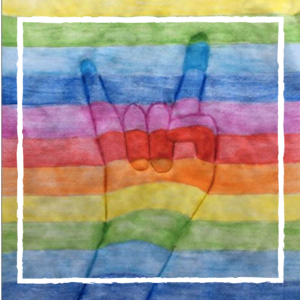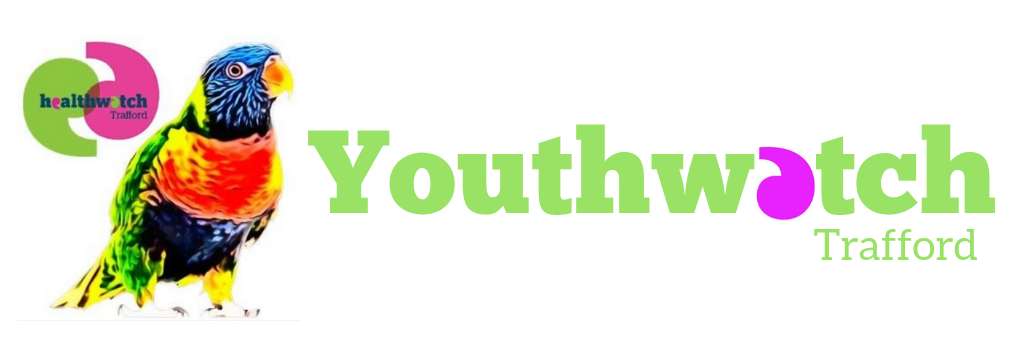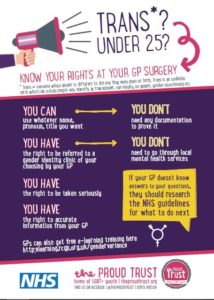Lesbian, Gay, Bisexual, Trans & Queer + (LGBTQ+)
What is LGBTQ+?
LGBTQ+ stands for ‘Lesbian, Gay, Bisexual, Transgender, Questioning your own sexual identity/Queer plus’. The + sign represents the spectrum of different sexualities and genders.
Though there is growing acceptance of the LGBTQ+ community in the UK, some LGBTQ+ people still have fears and stigmas do still exist.

Being LGBTQ+ is something that is seen differently by different people.
Some might see it as something that is a part of their unique identity, and something which makes them who they are. Others might see it as something which is completely normal and may prefer to think that it does not make them ‘unique’. You can choose to see being LGBTQ+ or any other sexuality however you wish but remember that you can be proud of who you are, just like anyone can. Anyone, whoever they are, whatever their sexuality, should be valued and treated the same!
There are lots of terms to reflect different sexualities or genders (see www.healthline.com/health/different-types-of-sexuality#why-it-matters) but there is no pressure to label yourself.
Unfortunately, in today’s society, some people who are LGBTQ+ do still face some difficulties.
● They may struggle to accept themselves
● They may feel pressure from the community or from family
● They may be more susceptible to mental health problems
● They may fear coming out to people
Advice for dealing with difficulties:
- Try to be proud of who you are – you are no less worthy of a happy and successful life than anybody else.
- You could think of being LGBTQ+ as a part of you, which makes you the person that you are – in this sense, you might think that it makes you ‘different’, in a good way.
- You could think of being LGBTQ+ just like coming from a particular country, or going to a particular school – something which is completely normal, even if some others don’t see it that way.
- You might see it as a combination of the two perspectives.
- Again, you can choose to see being LGBTQ+ however you wish. But remember that you are just as valued, just as important, and just as amazing as anyone else.
- It’s not your fault that people might look at you differently: stereotypes and stigmas, though they are on the fall, do still exist.
- If you have a low mood, are feeling stress, having anxiety and maybe this is interfering with your daily life, even if the impact seems to only be small, talk to someone. Try to find people who you trust and who you know will support you. Explain how you feel to them and discuss the problem. This could be a parent, friend, teacher, GP, social worker or counsellor for example. You could also make an appointment with a health professional such as a GP or counsellor.
- Try to find local LGBTQ+ groups. The local one for Trafford is listed below, and local ones for other areas in and around Manchester can be found using the following link: www.theproudtrust.org/for-young-people/lgbt-youth-groups/proud-trust-groups/
- If you feel like you need urgent help, for example, if you are having suicidal thoughts, call one of the numbers in the ‘Urgent assistance’ section below
Being LGBTQ+ does not mean that you won’t achieve what you want to in life. Plenty of people who are LGBTQ+ have gone onto be successful, and have achieved their aspirations, just like anyone else!
The Proud Trust have a great calendar of LGBTQ+ dates here to help you celebrate!:
www.theproudtrust.org/wp-content/uploads/download-manager-files/LGBT+%20Calendar%202021.pdf
Advice about coming out:
(from www.youngstonewall.org.uk/get-support/coming-out-lgbt)
- Think about when and where is best for you. Different people like to come out in different ways, so do what is most comfortable for you.
- Think about who you want to know and who you don’t want to know, and remember that messages can spread and someone who you don’t want to find out could do so – think about how you will manage this.
- Remember that it may come as a surprise for those who you are telling, which is understandable as it is new information for them even though you have known for longer.
Advice for everybody:
- If someone wants to talk to you about difficulties they are having, be open, don’t interrupt them or judge them, but empathise with them. It is normal that you may feel surprised or confused to learn that someone is having such issues.
- Learn more about mental health issues and being LGBT to better understand what some people are going through – this can help you provide more relevant support.
Challenge stereotypes and avoid making jokes or negative comments about LGBT people.
Know your rights!
Know your rights as a trans person at your GP surgery from the Proud Trust
LGBT+ Groups at your school or college:
The Proud Trust has noticed the number of secondary schools and colleges in Trafford setting up their own LGBT+ groups. This is a wonderful development, offering students – many of whom might not be able to go to their local LGBT+ youth group – the opportunity to access information and have fun, in a safe and supported environment.
This ‘How to Set Up an LGBT+ Group in a School or College’ guide will give you all the tips and pointers you need, to help you set up your very own in-school or in-college LGBT+ group.
Other resources:
- Specific advice about being trans:
- Coming out:
Where can you get help?
- Rainbow Reflections (part of the Proud Trust) – A small, welcoming youth group for people under 25 which meets every Wednesday from 4.30pm to 6.30pm in the Talkshop in Sale. The group is part of the Proud Trust. Please get in touch before attending to arrange a youth worker to meet you.
For more information, contact Rainbow Reflections on 0161 660 3347or emailing info@theproudtrust.org or visit www.theproudtrust.org/wp-content/uploads/download-manager-files/RR_digital_flyer.pdf – the Proud Trust’s main website is at www.theproudtrust.org/for-young-people/
Alternatively, you could contact Trafford Talkshop directly by calling 0161 912 2453 or emailing talkshop@trafford.gov.uk or visit www.trafforddirectory.co.uk/kb5/trafford/fsd/service.page?id=axGZQC-KNbQ - Gendered Intelligence – GI – An online youth group for transgender people. Email youthwork@genderedintelligence.co.uk with the subject ONLINE YOUTH GROUPS – see genderedintelligence.co.uk/support/trans-youth/groups for more information.
Used this service? Tell Healthwatch Trafford about it here.
Urgent Help
Find somebody who you can talk to. There are people who won’t judge you and will be willing to help, such as a teacher or friend.
Or you can use one of the contacts below for support online or through the phone:
- LGBT Switchboards:
- Telephone: 0300 330 0630 (London Lesbian and Gay Switchboard – covers all UK). Email chris@switchboard.lgbt
- Website: switchboard.lgbt – online chat service to talk about any LGBTQ+ related concerns with a link to an emotional well-being support pack.
- Mermaids Helpline (provide support around gender identity/ being transgender. The website has newsletters; advice for young people and parents; a helpline; and a 24 hour texting crisis support):
- Text: 85258
- Telephone: 0808 801 0400
- Email: info@mermaidsuk.org.uk
- Website: www.mermaidsuk.org.uk
- Childline (can help with any issue you may have):
- Telephone: 0800 1111
- Website: www.childline.org.uk
- The Samaritans (confidential support for suicide, suicidal thoughts, feelings of despair or distress):
- Telephone: 08457 909090 – this is a 24-hour helpline
- Email: jo@samaritans.org
- Website: samaritans.org/
- Albert Kennedy Trust (if you are 16-25 and LGBT+, they provide a live chat that you can use if having any problems, such as housing issues):
- Website: www.akt.org.uk/get-help


